Over the years, I’ve gotten a considerable amount of questions from people wanting to live their dream and buy an apartment in Paris. When buying mine, I learned quite a bit (more than I thought!) but the most important thing was the value of having someone on your side who knows the ins and outs, and idiosyncrasies, of the unique world of Paris real estate.
A big challenge is the difference between the French and American systems. Unlike what you see on television shows elsewhere (including the U.S.), buyers in France don’t typically have their own agents looking and representing them. So when you’re buying a place, you’re relying on the seller’s agent to properly represent the property. (Hmmm…what could do wrong? Answer: A lot.)
Without a multiple listing service (MLS) in Paris, you need to do all the searching for yourself through newspapers, online ads, real estate agency windows, and talking to locals, to find a place. I know because I spent a few years doing that before I found my apartment.
My friend Miranda Junowicz Bothe founded Paris Property Group, a househunting company that helps locals and foreigners find the property of their dreams, without the nightmares, navigating the purchase from start to finish. I met Miranda many years ago and we became fast friends. Fluent in four languages, not only did Miranda graduate from Yale Law School, she is also a featured guest host starring on HGTV HouseHunters International, where she’s helped people navigate the world of Paris real estate.
Miranda now divides her time and talents between Paris and Palo Alto, and I was happy to chat with her, as she shares her thoughts about what makes the Paris real estate market so special and unique…
(Also you can check out my podcast with Miranda.)
______
David: Hey Miranda. I’ve missed you! It’s been an interesting few years and I’m used to seeing you more often. So it’s great to chat.
I’m pretty sure that I met you at a party in a loft, in Paris back in 2008, hosted by a friendly group of French rugby players. I remember a lot of drinks, and not much else, but I do remember meeting you.
(Oops! Just found this pic of me and one of the party guests, sharing drinks that night, circa 2008…😲)
A lot has changed since then (thankfully for me!), and you and I have become good friends and have shared a number of life experiences together. From what I’ve seen, your best qualities are your determination to get the right outcome with whatever situation comes along, and how sharp you are. And after a lengthy search on my own, you helped me get my apartment in Paris. I’m not super savvy about French real estate and now understand the value of having someone with experience and determination on your side.
So many people dream of owning a place in Paris, and you are one of those people that can make that dream come true. How long have you had Paris Property Group and why did you start it?
Miranda: I remember that party too, David! Life changing but only insofar as it was the beginning of a friendship I treasure.
When I first moved to Paris in 2003, my future husband and I spent nearly a year looking for an apartment to buy. There is no Multiple Listing Service (MLS) in Paris, which is a consolidated database of all the properties for sale in a market and is the system used in almost every U.S. city. There were very limited online resources at the time; but even today, there is not a single website that can boast or lists all the properties available for sale in Paris.
For that reason, our search entailed scouring print and online resources and contacting each individual listing agent on our own to learn more about, and arrange to visit, the properties. What’s more, since each agent can only sell whatever few properties they have listed, you can’t just wander into a real estate office and have them show you everything on the market. They have every interest in getting you in to see the property that they have…even if it doesn’t at all match the criteria that you are looking for, in the hopes you might just cave and buy it anyway. As much as it is fun to visit Paris apartments, we spent countless hours arranging showings and visiting apartments we would never want. We were clear and insisted that we wanted a 2-bedroom, but were shown at least five 1-bedroom apartments, each time the agent telling us, “You’re a young couple, you’ll be fine with one bedroom!”
We ultimately visited 45 properties before we found the one that we bought. And we spoke French! I realized that navigating the property buying world as a foreigner who didn’t speak French would be an even bigger endeavor, even more so for buyers hoping to come in for a short trip to buy their dream pied-à-terre. I realized there was a useful service that I could provide for anglophone buyers and ultimately started Paris Property Group to do just that. Today we offer a suite of end-to-end services and work with buyers and sellers - both French and foreigners - to successfully navigate this unique market.
David: A lot of people don’t realize how different the process is of buying property in France vs. other countries. As you mentioned, the biggest difference is that there’s not only no MLS, but also no websites like Zillow, Redfin, or Streeteasy that cover the entire city and let you browse for yourself, which is shocking to many Americans used to being able to search and see everything that’s for sale in their town or city, on one website.
So if you’re looking for...say, a one-bedroom apartment in the Marais, to find one, you have to go to all the different real estate agencies in the Marais (since as you said, agencies only represent properties in their specific neighborhoods), as well as search online - and as I’ve learned, many places are found just asking around in neighborhoods you’re interested in. In America, you’d never start up a conversations with a stranger in a café and ask if they know of any places for sale, like you’d do in Paris.
In addition to how (and where) properties are listed, what are some of the other differences, including cultural, that people need to navigate when purchasing an apartment in Paris?
Miranda: I have bought and sold property in three countries: France, Germany, and the United States. In each country, the system is vastly different. Particularly for Americans, so much of the process is completely foreign and you need to leave your expectations at the door and be ready for a completely different buying process than what you are used to.
First…don’t expect to see the address of the property posted online! Because there is no MLS in Paris, sellers will often list nonexclusively with a number of different real estate agents, and will also try to sell the property on their own, too.
The French are very discreet about their finances, and in most cases don’t even want their neighbors to know that they are selling. Still, they will often tell the guardienne who lives in the building, and many sales still happen without an agency, as you mentioned, but simply by word of mouth. Without an exclusive contract, agents are rightfully fearful that other agents or buyers will go around them and they will lose their commission; which is why they are so secretive about the details. What’s more, with more than one listing agent per property, you may see the same property advertised at different prices at several agencies! You’ll definitely want to visit with the agency that advertises the lowest price, for obvious reasons…if you can find it.
In order to sell a property in Paris, the seller must provide certain information and diagnostic tests: How big is the property, its energy efficiency, the presence of any lead-based paint or pests, among several others. There is no duty to correct any potential issues, just the duty to inform. In most sales today, the buyer hires a professional who does the measurements and tests and certifies the accuracy of that information.
Another big difference that surprises foreigners, especially those who’ve lived in cities where bidding wars are commonplace, is that a listing agreement (with the price) in France is considered an offer by the seller to sell at that price.
That means that, if you, as a buyer, offer the list price to an agency, the seller is obligated to accept your offer - even if you have a mortgage contingency. This is vastly different from many U.S. markets like Silicon Valley, the other market where I work as a real estate agent, where multiple offers and bids come in at hundreds of thousands of dollars over the listed price, as is the norm today.
David: That surprised me a lot, Miranda, that the seller is obligated to accept the offer if you come in at the asking price. Coming from San Francisco, where there are multiple offers over the asking price, and things get competitive, it seems almost quaint to pay the actual price for a place that’s for sale. I explained that to Romain once and he was floored that people would pay more than the listed price. And honestly, when I phrase it like that, it does sound odd!
(And you’re also spot-on about the French being very ‘discreet’ about anything financial, which is why many beautiful residential buildings in Paris are hidden behind closed doors, where you can’t see them.)
Also, unlike in the U.S. where people can view comparable prices (comps) for properties around where you are looking, to get a feel for prices of similar properties, that information isn’t available to the public, ever.
[A few readers have reminded me of the Etalab website, which lets you know prices of similar properties in neighborhoods, but they only list sales by building, and don’t specify which exact apartment they are referring to. But it is an indication of relative prices in the area. Websites like Efficity will also provide you with estimations prices per square meter of apartments by arrondissement in Paris.]
I also find it curious…okay, kind of strange…that in France, the seller’s agent represents the buyer, too. I’ve not figured out why that’s still the case since it seems like a good idea for each party to have their own representation (as we do in the States), to avoid any conflicts of interest, but as I’ve learned, and as you’ve mentioned, you’ve got to leave your expectations at the door and adapt to another way of thinking.
Miranda: Yes David, as you now know from buying your first place, in most transactions in France, the listing agent will represent both the buyer and the seller, and negotiate on behalf of both. For French buyers this has always been the reality, so they don’t really question the inherent conflict of interest for one agent to represent both sides. If you do bring your own real estate agent to represent you on the purchase, you may have to compensate them on top of the fees already in the purchase price, unless the listing agent is ready to split their commission. For apartments less than €1.5 million, most listing agents won’t agree to a split.
Real estate agents in France do very little of the contractual or legal work and the closing process is overseen by a French notaire, a lawyer specialized in real estate transactions. Here too, one notaire can represent both sides; but since it doesn’t cost more to have your own notaire (the fee is then split between them), it’s ordinarily advisable to do so.
David: When I was looking for my apartment, the listings tended to be...um, very...casual, shall we say? I’d often see unmade beds, clothes (including undies and bras) drying on racks in the living room, sinks overflowing with dishes, or a photo of just the outside of the building. I saw a picture of an apartment whose walls were splattered with red paint (which looked like a crime scene), one place where the toilet was affixed to the wall right next to the bed (which admittedly was convenient for those who get up in the middle of the night to ‘go’…) and I recently saw a listing that was just a photo of a sofa pushed up against a bare wall. And that was supposed to represent the apartment.
(In the last few years, though, listings have improved dramatically at some agencies and many have gotten the hint to tidy things up before taking pictures.)
Another big difference that was hard for me to get used to Miranda, was that the seller is often in the apartment during showings, which I found unnerving since I couldn’t be as candid as I normally would be if the sellers weren’t standing right there in front of me and Romain, listening to us ruminate over the good and bad points of the apartment we were looking at. I’ve since realized that the French are sturdier than we are and don’t mind if you point out things that you don’t like in their apartment. Well, sometimes…!
Miranda: Ha! I could tell you some stories...
One time, on a visit to a stunning (and expensive!) Marais apartment with my American clients, we entered to find the teenage children of the sellers sitting at the kitchen table with their half-eaten dinner in front of them, smoking cigarettes. My clients felt personally slighted by the scene! Suffice to say, as you learned, staging is not culturally part of the French property sale process.
But in some ways, that makes sense: staging is usually overseen by a listing agent, who knows they will sell the property and is ready to invest time and money to make it more attractive on the market. With several agents representing the same property, none of them have this incentive. At Paris Property Group we only take exclusive listings, so that we can work with the seller on presenting the apartment in the best possible light and get the highest sale price for our client. Still, it can take some serious convincing to get them to invest in a proper cleanup!
David: I can imagine the shock for someone to enter an apartment to find a family having a smoke with their teenagers. I saw a place with a friend recently where the owner of the apartment had left some of their, uh…adult novelties, on the nightstand. I assumed they forgot to put them away but when we went back for a second visit, they were still there.
Because even the French are busy and don’t have time to look at 45 (or more!) apartments, I know French people and foreigners are using chasseurs, apartment hunters, like you are. The process invariably does take time, no matter what route you go, but a hunter can definitely help narrow things down, and oversee the search and eventual sale, on the buyer’s behalf.
Once someone has decided they want to buy a place, how long does the process usually take in Paris, from start to finish?
Miranda: From the time your offer is accepted, it can take 3-4 weeks before a purchase contract is actually signed by the parties. At that signing, the buyer must deposit 10% of the purchase price in the notaire’s escrow account, which she or he will lose if they fail to perform under the contract. The closing period is also long, usually 2-3 months. During that time, the notaire confirms that the seller has good title to the property and that all mortgages and liens will be paid through the proceeds of the sale.
The notaire also performs a number of administrative formalities, including calculating the capital gains tax owed by the seller and the purchase taxes (stamp duties) owed by the buyer. The “notaire fees” paid by the buyer, which include these stamp duties and the notaire’s fee for services, are between 7-8% of the purchase price. While that will seem extraordinarily high (to Americans in particular) for purchasing a property, annual property taxes in Paris are between 0.1 and 0.3% of the value of the property, a fraction of what they are in the US. The process culminates in the signing of an acte de vente, after which you are the proud owner of your Paris apartment.
David: Yes, it surprises people who aren’t French to learn that the buyer pays both the seller’s real estate agent fee, and the notaire fees, which are a combination of taxes and administrative fees, sort of similar to what we call “closing costs” in the U.S. which the seller pays, not the buyer. Can you go into that a little more?
Miranda: The list price advertised for properties for sale in France includes the listing agency fees in the price. The law changed several years ago requiring that the listing indicate the actual amount of the fees being charged. As such, yes, the buyer “pays” the listing agent commission as part of the total price of the property. The advantage with that system is that the loan amount is based on the property price plus agency fees, rather than the fees having to be paid separately at closing. The disadvantage is that notaire fees (also called stamp duties elsewhere) of 7-8% are then calculated on that total amount. The buyer can ask his notaire to separate out the fees in the initial purchase agreement to exclude them from the stamp duty calculation.
Stamp duties, or notaire fees, are entirely the responsibility of the buyer and paid at closing. These include the fee for the services of the notaire, administrative fees associated with the city of Paris and the French government, and purchase taxes due on sale. No way around the notaire fees. On the positive side, they are significant enough to discourage real estate speculation that has exploded prices in other real estate markets.
David: Yes, there’s a lot less incentive to “flip” a place since there are significant fees when you buy a place, which is definitely an upside and compared to places like New York City and San Francisco, Paris seems more affordable, especially with the low property taxes. The process does take time, though as do many things in France, but it’s worth it as Paris is a pretty spectacular place to live, whether it’s full-time or just as a frequently-returning visitor. What are some of the advantages to owning your own place in Paris versus renting an apartment from time to time?
Miranda: Mortgage rates for residents right now are hovering around 2%, which continues to fuel their interest in buying over renting: If it costs nearly nothing to borrow, and savings accounts are paying interest rates of next to nothing, as they are now, the advantages of a real estate investment in a solid, steady growth real estate market are clear.
Nonresident buyers are often driven by a pride of ownership and a long-standing dream of owning a property in Paris: Styling it how you want, getting to know your local bakery and butcher and restaurants, and feeling like a genuine Parisian. For many, visiting and renting a different apartment each time, or staying in hotels, just doesn’t provide the same experience. Because short-term rentals are no longer allowed for nonresident’s apartments, that experience has to be enough to be worth carrying the expenses that can only partially be offset with medium-and long-term rentals (unless you don’t want to use the property at all and can rent it out full-time). For this reason some buyers have turned to fractional ownership properties, where they buy a share in an apartment that reflects only the amount of time they will actually use it, say a few weeks or months, so they are not carrying all of the expense of owning on their own.
David: You’ve had a number of clients post their successful purchase and renovation experiences under Client Stories on your The Paris Life blog, which shows how wonderful it can be to have an apartment in Paris, which is encouraging!
So many people ask me: What’s the best arrondissement to buy in? Visitors often focus on the 6th, 7th, or the Marais but where do you find most people would like to live?
Miranda: Hard to say! The best arrondissement for a buyer, especially a foreigner, who wants to be centrally located and close to all the great fashion and shopping, will tend to be the Saint Germain des Pres (6th arrondissement) on the Left Bank, or the Marais (3rd and 4th arrondissements) on the right. But a lot of residents tire of these heavily touristed areas, and opt for more eclectic and everyday neighborhoods with a younger, more French population, like the 10th, 11th and 12th arrondissements, or areas that offer a more elegant, idealized French experience at a more budget price, like the 16th and 17th arrondissements. Each neighborhood has its own vibe and style, and the choice of buildings and apartments vary widely from one area to the next. What makes Paris particularly special is that you can walk from one end of the city to the other in just a few hours! So really everything is more or less central, and you can find a neighborhood to fit almost any style. What’s more, as Paris has dedicated more and more resources to public transportation and eliminating private cars on the roads, the city has started to feel smaller and more accessible no matter where you live.
David: I remember seeing an episode of House Hunters International on HGTV that I believe you were featured in, where a couple balked at a perfectly lovely apartment that was two stories up, with no elevator. Even though more and more buildings in Paris are installing elevators, places in everyday neighborhoods tend to be for locals, in some respects, but maybe “too local” for tourists. (i.e.; lots of stairs, very little English spoken, etc.)
Do you ever try to guide people to outer arrondissements, where the prices are less and the neighborhoods are filled with normal working-class folks and families? If so, what are some of the advantages of living “off the beaten track”?
Miranda: It really depends on the buyer, and what they are hoping to get out of their Paris life. Prices in the outer arrondissements are significantly less expensive than in the center, and still enjoy the one-off specialty shops that have been driven out of the more touristy areas by expensive designer clothing and furniture stores. Some of the most creative restaurants in the city are popping up in these areas too, since rents are more accessible to younger chefs. If you are ready to venture out, yes, be prepared to polish your French, since the shops and residents are going to be less able to cater to your English. But another upside is that these areas have also offered a higher rate of price appreciation than swankier neighborhoods in recent years as well.
David: Unlike other cities, prices in Paris haven’t dropped much in recent years, in spite of strikes, gilets jaunes protests, and the pandemic. In fact, they’ve continued to climb. Do you see that trend continuing or do you think Paris is on the verge of a “correction”?
Miranda: Paris did see a bit of a correction over the last year, with the pandemic halting the market entirely for about two months, beginning in March of 2020. During that time, the volume of sales dropped a dramatic 80%, and prices flattened and slightly fell. In July of last year, as the market was allowed to reopen, the unmet demand surged again and property prices easily regained their losses. The reality is that Paris has seen such corrections in the past, but the rebound is always fast and furious. With interest rates at an all-time low, and international buyers able to realize transactions in any country with more ease than ever before, there is no reason to think that the upward price trend in Paris is going to end anytime soon.
Additionally, Paris has the Olympics coming up in 2024, and there are a lot of urban renewal projects going on that make every part of Paris more desirable.
David: You’re now dividing your time between Paris and Silicon Valley, working as a real estate broker in Palo Alto as well. Both are “hot markets,” as one might say, and homes (and prices) tend to shift very quickly. What’s the difference with how you help people in the States versus in France?
Miranda: In Paris, where there is no MLS or other marketwide database of properties, an important part of our work with real estate buyers is to source the best properties from a myriad of resources, online and through our network. As I mentioned earlier, apartments in Paris are often listed with more than one agent, which means pocket listings (private, unshared listings) are an important source of properties, and listings are all over the place in terms of how they are presented: what information is shared, the quality - and even the existence of photos (and video is almost unheard of). And the exact address of the property is never provided so you can’t see it without an agent. Properties in Paris are often lived in during the sale process, so even scheduling visits can be challenging.
In contrast, the Silicon Valley market is governed by an MLS, which means that any realtor can share in the listing commission fee and sell the property to their buyer client. All properties for sale are included in a comprehensive database that is readily searchable online and most often include professional photos and videos, floor plans, exact addresses, and information about schools, property taxes, nearby transportation, and much more. What’s more, most houses are staged and vacant when they come to market, and each realtor can bring clients to visit the home through a special coded lockbox almost any time of day. Finding and accessing the properties is a relatively straightforward part of our work.
Beyond the search process, the value of a good buyer’s agent in Silicon Valley or Paris is in helping the client assess the property in terms of its amenities, neighborhood, condition, quality, all of which speak to value, price and terms of a purchase. Buyers in both of my markets are often from out of the area, and helping them understand and navigate the purchase process is a key part of what I do. Having worked in these two places and with clients from all over the world in both, I can say that real estate transactions are completely different from one place to another; and working with someone who you trust and you believe understands the market and can navigate you through it is key.
Where the two markets differ again is that Paris listing prices are a sort of aceiling on a purchase - i.e., first to offer the listing price gets to move forward and buy the property. So, the strategy for presenting the right offer price and terms is rooted in acting quickly, and evaluating how far near or under the listing price to offer. Hesitation, and trying to win a few thousand euros discount, can mean losing the apartment of your dreams.
In Silicon Valley, the list price is often lower than the true value of the home in order to attract more interest. Good homes are expected to sell in 10 days or less, and there are often multiple buyers ready to offer on the home. In that case an offer date is set, and the final price can go hundreds of thousands of dollars over the list price. The process can be really nerve racking! Once we find the right house, my strategy is to build an offer with all the pieces in place and the most attractive terms to win the bid, at a price that makes sense for the long-term investment, with an approach that instills calm and confidence in my client.
David: Speaking from experience, I do have to say having your wisdom, guidance, and perseverance can either make or break a sale. I’ve seen how well you work and go to bat for your clients, and it’s impressive!
In addition to having a second home to vacation in Paris to visit whenever you want, where you can keep all your clothes and personal items until your next trip, many people talk about owning property as an investment. France is sometimes known as a place where it’s hard to do business or where taxes are high. What’s your take on an apartment in Paris as a longer-term investment?
Miranda: Paris real estate attracts local buyers and investors from around the world, which has translated into demand that outstrips supply consistently, and a consistent rise in real estate prices. The long-term increase in value is a staple of the Paris market: Small corrections happen, but over time the value goes up consistently. Paris real estate is about as safe an investment in residential real estate as anywhere and investors can expect a good return on their money. If you are ready to hold onto the property long enough, capital gains taxes reduce over time, so more of the gain realized goes into your pocket the longer you own.
For non-resident buyers, as we talked about earlier, owning a second home in Paris was once a short-term rental bonanza that allowed owners to cover their mortgage and turn a nice profit when they were not using their apartment. Due to a serious housing shortage, Paris has outlawed rentals of less than one month for second homes, so non-resident buyers who want to use their apartment liberally and not rent longer term, need to be ready to carry their expenses without this ready income. Property taxes are only 0.1 to 0.3% of the property value per year, and building association fees are quite reasonable as compared with other major cities (€150-350/month), so still many international buyers are not deterred.
David: Thanks for sharing all that info. As you said, it helps to change your expectations, and perhaps to have someone on your side to help navigate the process. The real estate market in France is quite different from elsewhere, but there are some advantages, like low fees and property taxes, which certainly are more affordable than elsewhere. And, of course, everyone wants to live in Paris.
Speaking of which, I can’t wait to see you again and catch up at a café or share a meal in a local bistro. Can you let my readers know some of your favorite places to eat in Paris?
Miranda: Some of my favorite places are outdoor spaces, especially after the year we’ve had. Casual places like Ground Control or Recyclerie are indoor / outdoor community spaces that combine garden space with food and beverages and are popular at all times of the day or night. The Seine and the Canal St Martin are lined with floating and land-based restaurants, making them lively nighttime areas to stroll. And outdoor terraces like those adjacent to museums or monuments have impressive views, such as George atop the Centre Pompidou, Les Ombres on Musee Quai Branly, Perchoir above the BHV or its original location in the 11th, and Perruche on the roof of Printemps.
David: Thanks so much Miranda. Can’t wait to see you again…hopefully, soon!
Visit Paris Property Group here.
Follow Paris Property Group on Facebook, Twitter, and Pinterest.
Subscribe to the Paris Property Group newsletter to get the latest on Paris and the Paris real estate market.





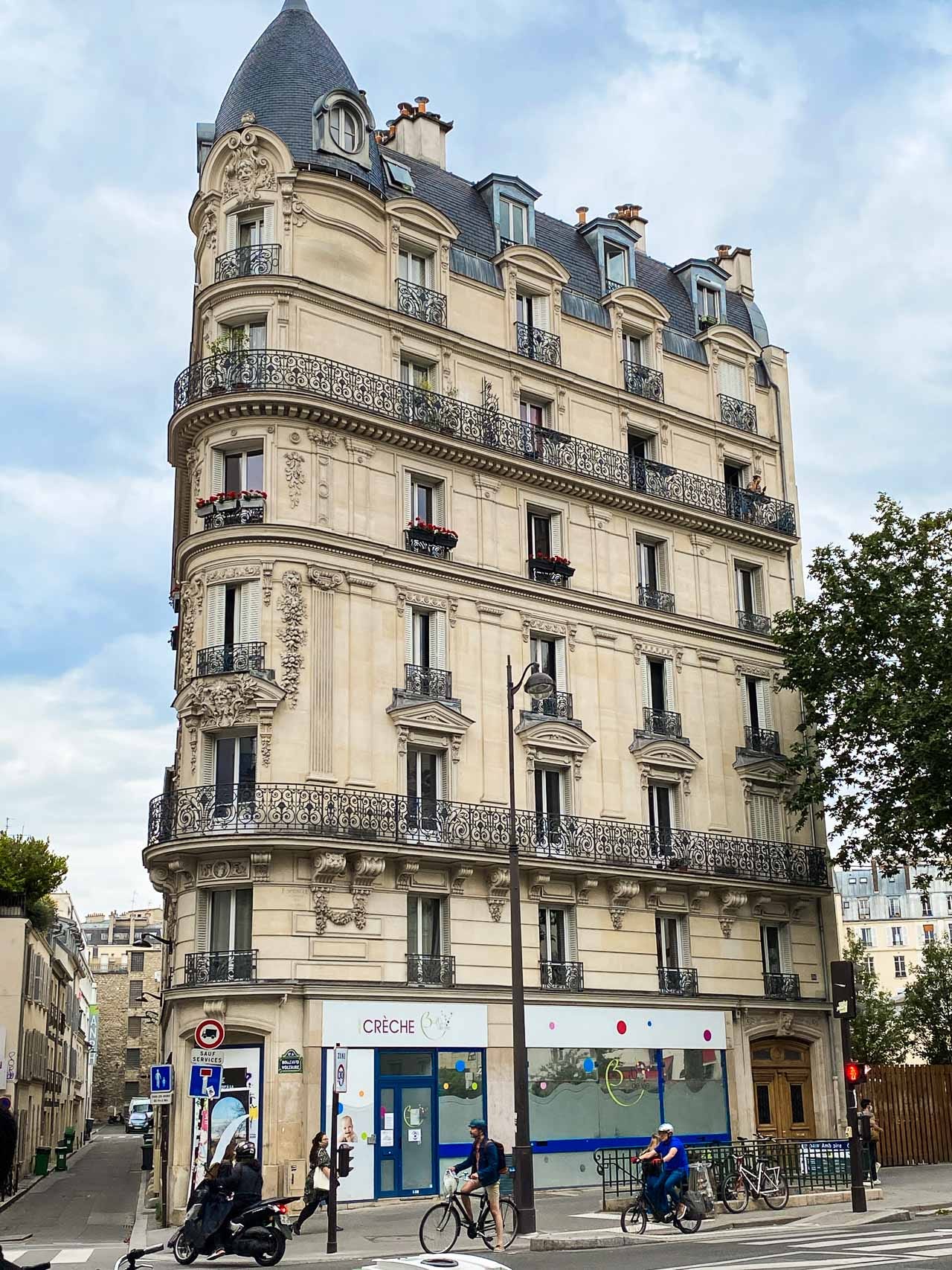
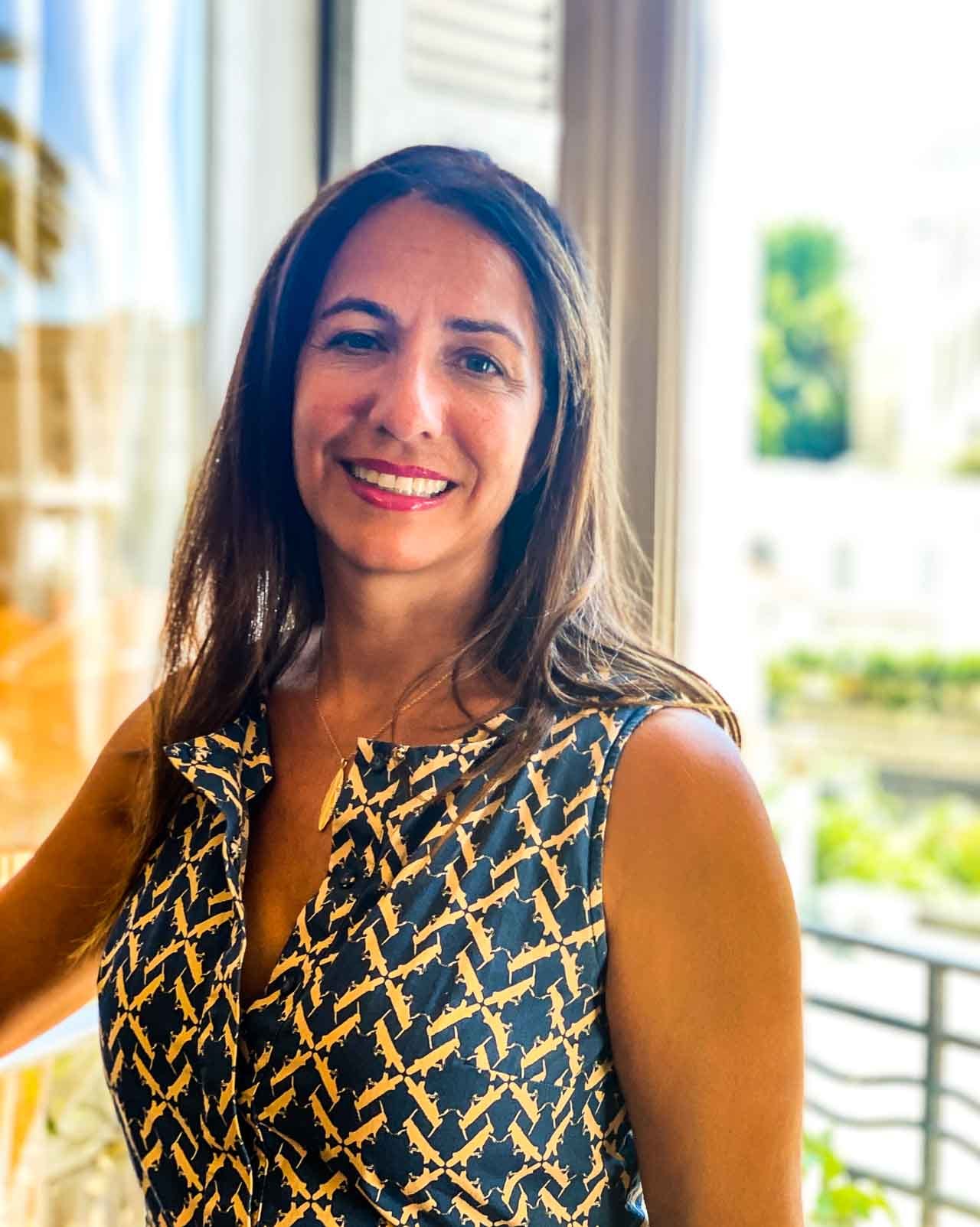
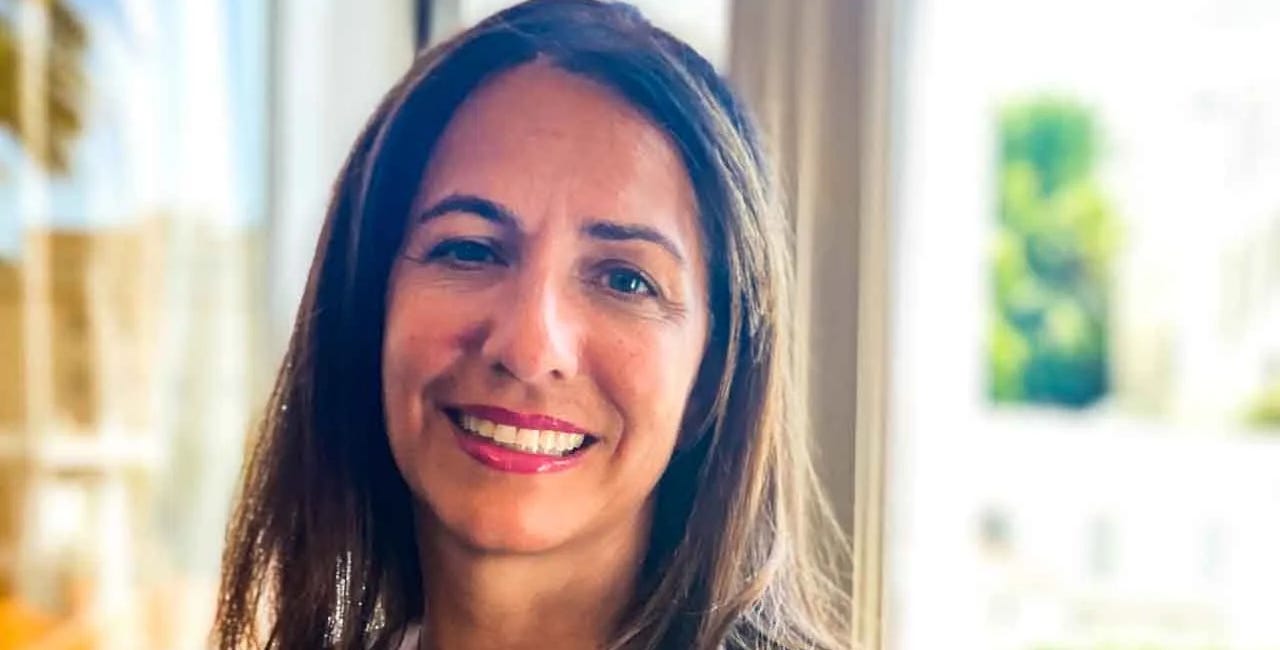
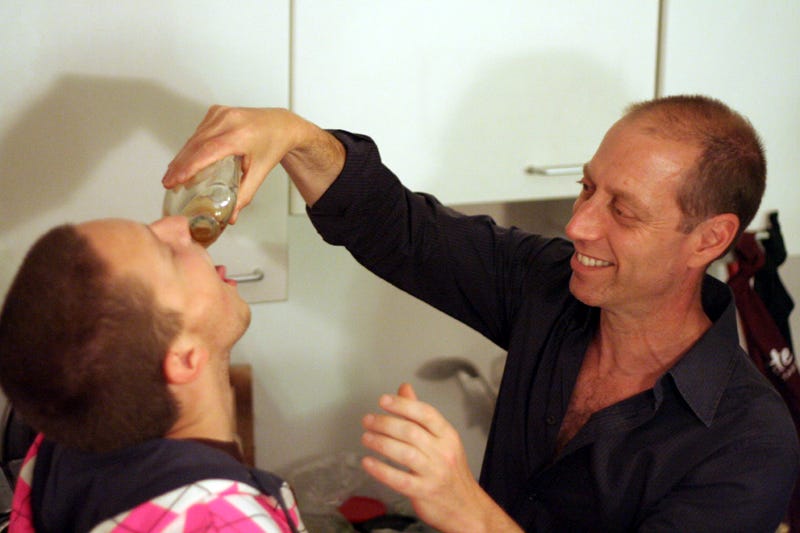
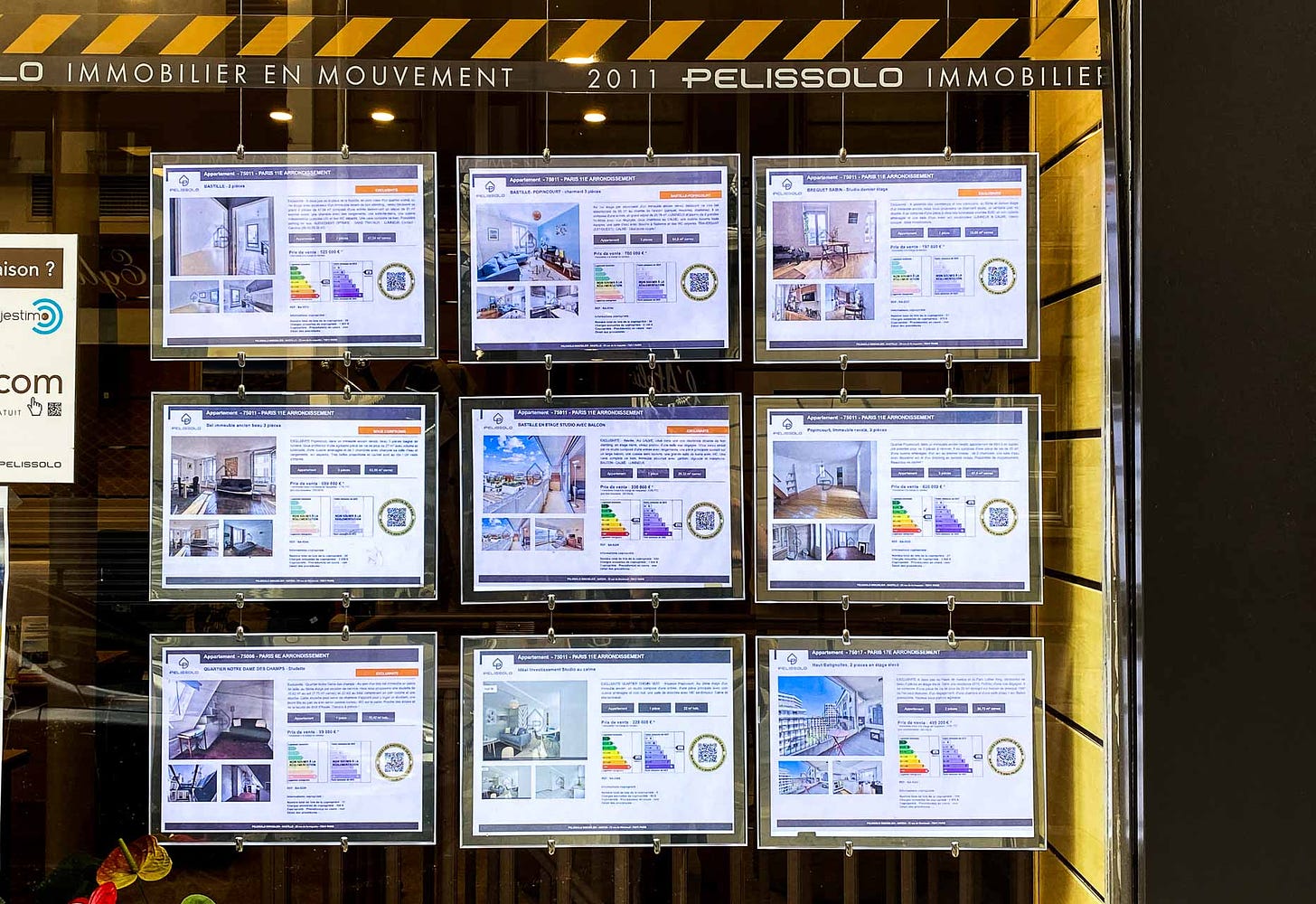

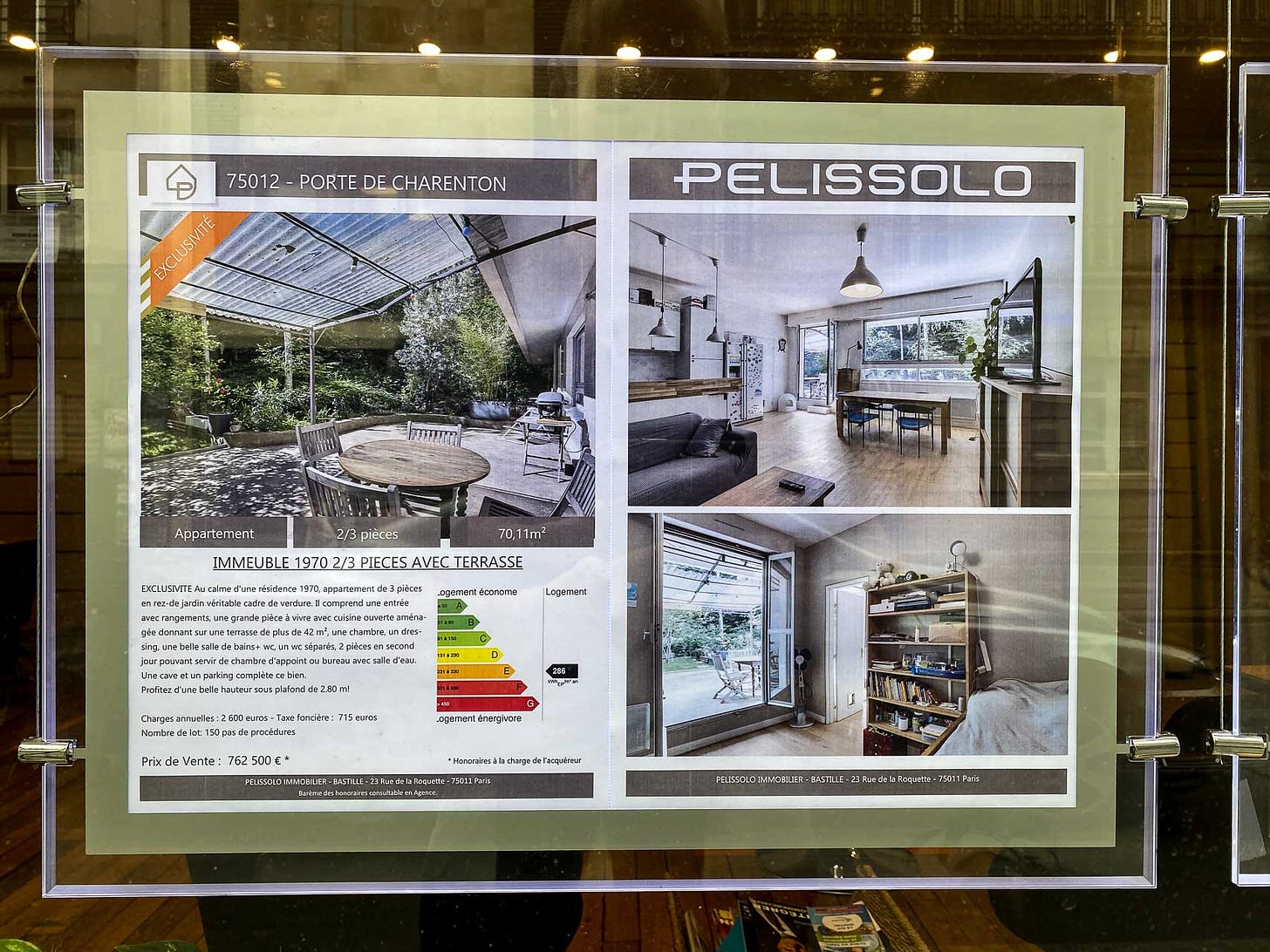
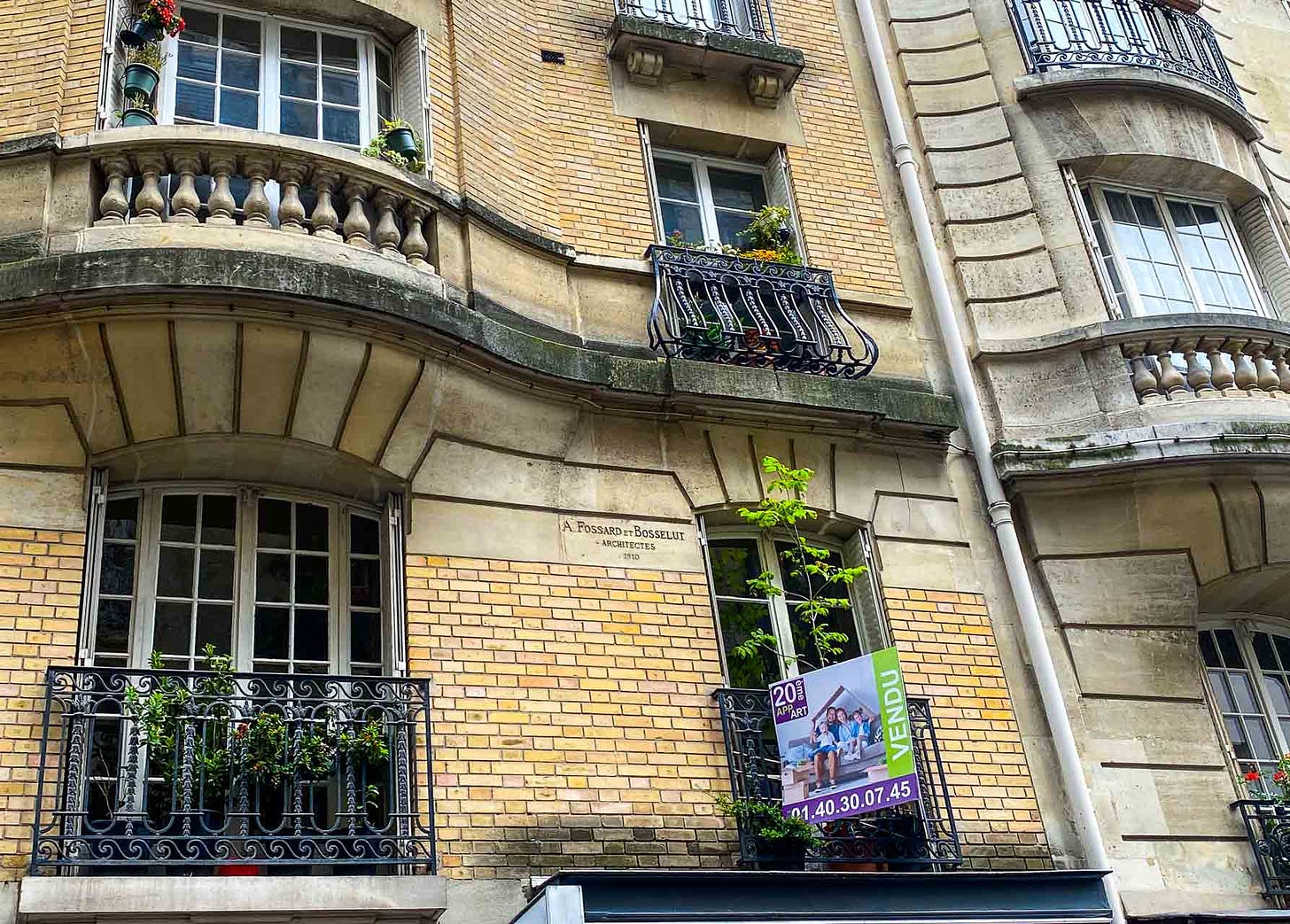
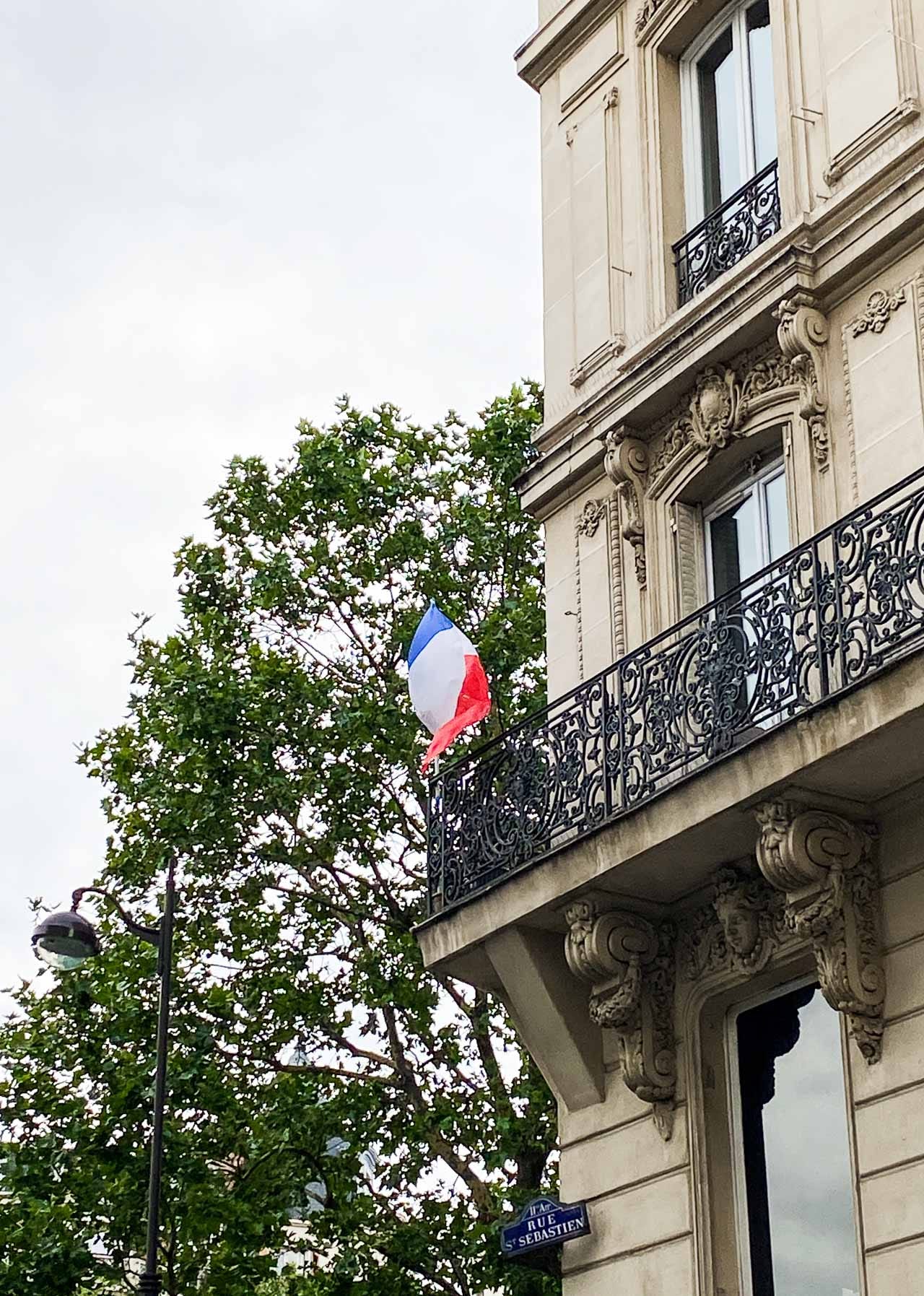
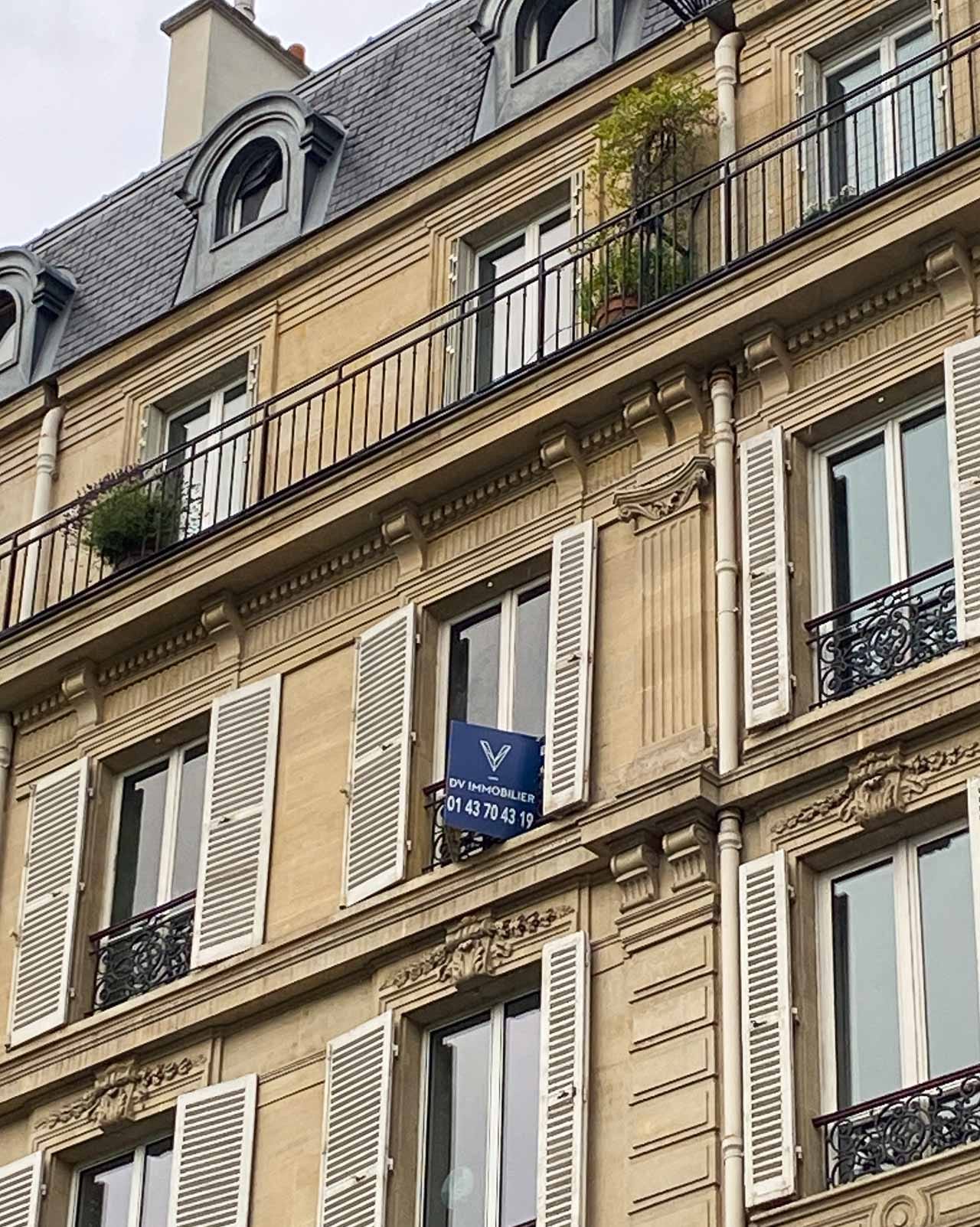
Such an excellent overview, written in a manner that is understandable! Thanks to both of you!
David, I, too, read L'Appart and was horrified at what you went through and how you were treated - by the seller, by the idiot contractor and the others who treated you so badly. This interview with Miranda Bothe gives us an excellent insight into how things work in France and how that contrasts with the American real estate market and our regulations. The same agent representing both seller and buyer? That's a disaster waiting to happen! Thank you for your books, newsletters, photos an posts. You open so many doors to those of us who can only dream.